West Highland White Terrier Dog Bed
Make Westies Comfortable with A Bed!
Introduction
The West Highland White Terrier dog bed takes into account their sleeping position, health issues, and preferences. Orthopedic or memory foam bed is best.
The West Highland White Terrier, affectionately known as the “Westie,” is a small yet robust dog breed with a big personality. Originating from Scotland, the Westie was initially bred for hunting small game, particularly rodents, thanks to its keen sense of smell and strong prey drive.
Westies are known for their lively, independent, and friendly nature, making them a popular choice among dog owners seeking a loyal companion. Despite their small stature, Westies are fearless and exhibit a strong sense of confidence, often acting as if they are much larger than they appear.
This boldness, combined with their intelligence, makes them an entertaining and sometimes challenging pet, especially for first-time dog owners. Their affectionate nature, coupled with a love for play and interaction, makes Westies an excellent fit for families, singles, and even the elderly.
However, their energetic nature and occasional stubbornness may require consistent training and plenty of exercise to keep them engaged and well-behaved. With proper care and attention, the West Highland White Terrier will reward its owners with years of loyalty, charm, and companionship.
In this guide, we share information about the West Highland White Terrier that new dog owners may not know. The topics include best dog bed types, best brands, health issues, behavior concerns, tips for new owners, costs of ownership, safe foods and foods to avoid.
Best Dog Bed Types
Here is a list of the best dog bed types you can recommend to new West Highland White Terrier owners, along with the reasons why each type is suitable:
- Orthopedic Dog Beds
- Why? West Highland White Terriers, especially as they age, can develop joint issues such as hip dysplasia or arthritis. Orthopedic beds provide support for their joints, relieve pressure points, and promote better sleep quality.
- CertiPUR-US Seal: When shopping for an orthopedic or memory foam bed, be sure to look for the CertiPUR-US seal. The seal means that the materials used do not contain any toxins or chemicals that are harmful to humans and pets.
- Memory Foam Beds
- Why? Memory foam beds contour to the dog’s body, offering superior comfort and support. They are great for dogs of all ages, but especially beneficial for older Westies or those with joint problems. These beds help improve circulation and reduce pain in pressure areas.
- Bolster Beds
- Why? Westies enjoy a sense of security, and bolster beds with raised edges offer a supportive barrier they can lean against. The bolsters also provide extra comfort, especially for dogs who like to curl up while sleeping.
- Cooling Gel Beds
- Why? These beds are ideal for warmer climates or summer months, as they regulate temperature and help keep the dog cool. Westies have thick coats, and a cooling bed can help them stay comfortable during hot weather.
- Elevated Beds
- Why? Elevated beds allow for air circulation beneath the bed, which can help regulate body temperature and keep Westies cool. They are also easy to clean, durable, and great for outdoor use, making them versatile for both indoor and outdoor environments.
- Washable Dog Beds
- Why? Westies can be prone to allergies and skin sensitivities. Having a washable dog bed ensures that allergens like dust and dander can be easily removed, keeping their sleeping area clean and hygienic.
These bed types help to ensure that West Highland White Terriers get the best support, comfort, and cleanliness for their unique needs.
Best Dog Bed Brands
Here’s a list of some of the best dog bed brands that new West Highland White Terrier owners should consider and what makes each brand stand out:
- Big Barker
- Why? Known for their high-quality orthopedic beds, Big Barker beds are designed specifically for dogs with joint issues. They use premium foam that won’t flatten over time, making them a great choice for Westies, especially as they age.
- PetFusion
- Why? PetFusion beds are known for their memory foam design, providing excellent support and comfort. Their beds often come with bolster sides, which are perfect for dogs like Westies who enjoy curling up or leaning against something while resting.
- Furhaven
- Why? Furhaven offers a wide variety of bed styles, from orthopedic to cooling gel options. Their beds are also affordable while maintaining quality, making them a great choice for West Highland White Terriers of all ages.
- K&H Pet Products
- Why? K&H specializes in innovative designs such as heated and elevated beds. Their cooling and heated beds help regulate body temperature, which can be useful for Westies who may struggle with hot or cold environments.
- BarksBar
- Why? BarksBar is known for its durability and comfort. Their orthopedic dog beds are made from high-quality materials and often include bolsters, making them perfect for Westies who need joint support and love a cozy nook to lean against.
- Kuranda
- Why? Kuranda is well known for its elevated beds, which are great for airflow and temperature regulation. These beds are highly durable and easy to clean, making them ideal for both indoor and outdoor use, especially for Westies in warmer climates.
- Brindle
- Why? Brindle offers memory foam beds with waterproof covers, providing both comfort and protection. These beds are especially useful for Westies who may have skin sensitivities or allergies, as they are easy to clean and hypoallergenic.
- Majestic Pet
- Why? Majestic Pet offers durable and machine-washable beds, which are perfect for West Highland White Terriers prone to allergies. They have a variety of styles and sizes, making them versatile and easy to maintain.
These brands are known for offering beds that prioritize comfort, support, and durability, making them excellent choices for new West Highland White Terrier owners.
Facts and Fun Facts about West Highland White Terrier
Measurements:
- Size: Small
- Group: Terrier Group
- Height Male: 11 inches
- Height Female: 10 inches
- Weight M & F: 15 – 20 lbs.
- Length M & F: 15 – 20 inches
- Fully Grown: 12 months
- Lifespan: 13 – 15 years
- Color: White
- Popularity: This breed is the 43rd most popular in the United States according to the American Kennel Club in 2023.
- Intelligence: This breed is ranked the 47th most intelligent according to Professor Stanley Coren at the University of British Columbia.
Here’s a list of facts and fun facts about the West Highland White Terrier (Westie):
Facts:
- Origin: Westies originated in Scotland and were bred to hunt small game such as rodents and foxes.
- Size: They typically weigh between 15-20 pounds and stand about 10-11 inches tall at the shoulder.
- Coat: Their iconic white coat is double layered, with a harsh, wiry outer coat and a softer undercoat, perfect for harsh weather.
- Temperament: Westies are known for being bold, confident, and friendly, making them excellent companions.
- Energy Levels: These terriers are energetic and require daily exercise to keep them happy and healthy.
- Lifespan: They generally live between 12-16 years with proper care and attention.
- Health Concerns: Westies can be prone to skin conditions, allergies, and some joint issues like patellar luxation.
- Hypoallergenic: Although they shed less than many other breeds, they are not entirely hypoallergenic.
- Trainability: Westies are intelligent but can be a bit stubborn. Consistent training and positive reinforcement work best.
- Popular Dog Breed: The Westie has been a beloved breed worldwide and often appears in media and advertisements.
Fun Facts:
- Famous Nickname: Westies are sometimes called “West Highlanders” or just “Highland Terriers.”
- Royal Connection: They were favored by royalty, including King James I of England, who sent them as gifts to other monarchs.
- Media Star: The Westie is the mascot for the popular dog food brand “Cesar.”
- Strong Hunters: Despite their small size, Westies are fearless hunters, often used to catch rats and other vermin.
- White for a Reason: They were bred to be white so hunters wouldn’t mistake them for foxes during hunts.
- Sturdy Little Dogs: Westies may be small, but they are surprisingly tough and resilient.
- Active Minds: Westies love problem-solving games and puzzles, making interactive toys great for mental stimulation.
- Friendly with Other Pets: They usually get along well with other pets but have a strong prey drive, so introductions should be gradual.
- Big Personalities: Westies are known for having big personalities, often acting larger than life despite their size.
- Iconic Look: Their distinctive white coats and upright ears give them a distinctive and instantly recognizable appearance.
These facts highlight the Westie’s spirited personality and their appeal as both working dogs and companions!
Health Issues
Here is a list of the most common health conditions in West Highland White Terriers (Westies):
- Atopic Dermatitis (Allergies):
- Westies are particularly prone to skin allergies, which can be triggered by environmental factors like pollen, dust mites, or food.
- Symptoms include itching, redness, and recurring skin infections.
- Westie Lung Disease (Pulmonary Fibrosis):
- Pulmonary fibrosis is a serious condition where lung tissue becomes scarred, leading to difficulty breathing. It is often referred to as “Westie Lung Disease.”
- Symptoms include chronic coughing and labored breathing.
- Patellar Luxation:
- This condition occurs when the kneecap dislocates from its normal position, leading to pain and lameness.
- It’s common in small breeds like the Westie and may require surgery in severe cases.
- Craniomandibular Osteopathy (CMO):
- A hereditary bone disease that affects the skull and jaw in young Westies, typically under 1 year old.
- Symptoms include swelling of the jaw, difficulty eating, and pain.
- Legg-Calvé-Perthes Disease:
- A degenerative condition where the head of the femur (thigh bone) weakens and dies due to lack of blood flow, causing hip joint collapse.
- It usually presents with limping and pain in the hind leg, often requiring surgery.
- Dry Eye (Keratoconjunctivitis Sicca):
- Westies are susceptible to dry eye, where tear production is insufficient, leading to inflammation and potential damage to the cornea.
- Treatment typically involves medicated eye drops to maintain moisture.
- Cataracts:
- Cataracts can develop in Westies as they age, causing cloudy vision and eventual blindness if untreated.
- Surgery can often restore sight if diagnosed early.
- Hip Dysplasia:
- Though less common in small breeds, some Westies can develop hip dysplasia, where the hip joint doesn’t fit properly, causing arthritis and pain.
- Managing weight and providing joint supplements can help reduce symptoms.
- Addison’s Disease:
- This hormonal disorder occurs when the adrenal glands fail to produce sufficient hormones, leading to weakness, vomiting, and lethargy.
- It’s treatable with lifelong hormone replacement therapy.
- Copper Toxicosis:
- Some Westies may have a genetic predisposition to copper toxicosis, where excess copper builds up in the liver, leading to liver damage.
- Symptoms include lethargy, vomiting, and jaundice, and treatment may involve medications to reduce copper levels.
Regular vet check-ups, a healthy diet, and proactive management of these conditions can help keep Westies happy and healthy throughout their lives.
Behavior Concerns
Here are some behavior concerns that new West Highland White Terrier (Westie) owners should be aware of:
- Stubbornness:
- Westies are independent thinkers and can be quite stubborn, especially during training. They were bred to work on their own as hunters, so they may not always listen to commands immediately.
- Patience, consistency, and positive reinforcement are essential when training a Westie.
- Strong Prey Drive:
- Westies have a natural instinct to chase small animals, thanks to their history as ratters and hunters. This can lead to them chasing squirrels, birds, or even household pets like cats.
- New owners should keep this in mind during walks or when allowing off-leash play, as Westies may run off in pursuit of something small and fast.
- Territorial Behavior:
- Westies can be quite territorial and may bark at strangers, other dogs, or noises they hear around their home. This makes them excellent watchdogs but can become a nuisance if the barking is excessive.
- Proper socialization and training can help manage their territorial tendencies.
- Barking:
- Westies are vocal dogs, and excessive barking is a common issue. They tend to bark when they are excited, anxious, or to alert their owners.
- Teaching them the “quiet” command early on can help curb unnecessary barking.
- Separation Anxiety:
- Like many small dogs, Westies can develop separation anxiety if left alone for long periods. They form strong bonds with their families and may become destructive or anxious if left unattended too often.
- Gradual crate training and providing mental stimulation (like puzzle toys) can help alleviate this issue.
- Possessiveness:
- Westies may sometimes display possessive behavior over their toys, food, or even their human family members. This can lead to guarding behavior, where they growl or snap if someone tries to take their belongings.
- Training them to “drop it” or “leave it” from a young age can reduce this possessiveness.
- Digging:
- Many Westies love to dig, a behavior stemming from their hunting background when they would dig to reach small animals. This can lead to them tearing up gardens or yards.
- Redirecting their energy with proper exercise and providing designated digging areas or toys may help minimize this behavior.
- Chasing and Herding:
- Westies may attempt to “herd” people, children, or other pets due to their natural instincts, which can involve nipping at heels or trying to direct movement.
- Early socialization and providing structured outlets for their energy can mitigate this behavior.
- Overconfidence with Larger Dogs:
- Despite their small size, Westies often believe they are much larger and may challenge larger dogs without fear. This can lead to potential conflicts during socialization or walks.
- Close supervision around bigger dogs and controlled introductions are important to avoid any confrontations.
- Need for Mental Stimulation:
- Westies are intelligent and can become bored easily if not mentally stimulated, which can lead to destructive behaviors like chewing or digging.
- Providing toys, training sessions, and interactive games will help keep their minds engaged and prevent boredom-related issues.
By understanding and addressing these behaviors early, new owners can ensure a well-adjusted and happy Westie!
Tips for New Owners
Here are some essential tips you can share with new West Highland White Terrier (Westie) owners:
- Start Training Early:
- Consistency is Key: Westies can be a bit stubborn, so it’s important to start training early with consistent rules. Use positive reinforcement methods like treats, praise, and rewards.
- Focus on Recall: Due to their strong prey drive, it’s crucial to train a reliable recall command to ensure they return when called, especially off-leash.
- Socialize Early and Often:
- Expose to Different Environments: Introduce your Westie to various people, dogs, and environments while they are still young. Proper socialization will help reduce territorial and aggressive behaviors later on.
- Encourage Calm Behavior: Teach your Westie how to behave calmly around other animals and people, particularly in social settings like parks or when guests visit.
- Provide Regular Exercise:
- Daily Walks and Play: Westies have lots of energy and require daily exercise to stay healthy and happy. Aim for at least one or two walks a day, along with playtime in a secure area.
- Interactive Toys: To engage their minds, offer puzzle toys or treat-dispensing toys that stimulate their problem-solving instincts.
- Be Prepared for Barking:
- Teach the “Quiet” Command: Westies can be vocal dogs. Start training them to control their barking early, using the “quiet” command along with positive reinforcement when they remain calm.
- Redirect Excess Energy: Sometimes barking can be a result of pent-up energy or boredom, so ensure they get enough mental and physical stimulation.
- Grooming is Essential:
- Regular Brushing: Their double-layered coat needs regular brushing to prevent matting and tangling. Aim to brush them several times a week.
- Professional Grooming: Consider professional grooming every 6-8 weeks to maintain their coat’s health and appearance, especially to keep their white coat bright.
- Watch for Skin Issues:
- Monitor for Allergies: Westies are prone to skin conditions and allergies. Regularly check their skin for signs of irritation or redness and consult your vet if any issues arise.
- Choose a Hypoallergenic Diet: If your Westie suffers from food allergies, consult your vet about hypoallergenic diets that avoid common allergens like grains or specific proteins.
- Mental Stimulation is Important:
- Training and Games: Westies are intelligent dogs that thrive on learning new tricks or commands. Keep their minds engaged by teaching them new tricks or playing interactive games.
- Avoid Boredom: Provide a variety of toys to prevent boredom, which can lead to destructive behavior.
- Prepare for a Strong Personality:
- Confident and Bold: Westies have a big personality in a small package. They often believe they are larger than they are and can be overconfident, especially around bigger dogs.
- Set Boundaries: It’s important to establish boundaries and rules early on to prevent bossy or demanding behavior.
- Health Check-ups are Crucial:
- Regular Vet Visits: Ensure regular vet check-ups to monitor common health issues in Westies like skin allergies, eye problems, or joint conditions.
- Preventative Care: Keep up with vaccinations, flea/tick preventatives, and dental hygiene to maintain their overall health.
- Ensure a Safe Environment:
- Secure Yard: Since Westies have a strong prey drive, ensure your yard is secure and fenced to prevent them from running off in pursuit of small animals.
- Avoid Hazardous Foods and Substances: Keep harmful foods and substances out of reach. Westies, like all dogs, should avoid chocolate, grapes, onions, and other toxic items.
- Treats:
- When training your Westie using treats, be sure they don’t exceed more than 10% of their total daily caloric intake. for the day. This helps prevent them from gaining weight which leads to obesity.
Bonus Tip: Patience and Love:
- Build a Bond: Westies can be independent at times, but they are also loving and loyal companions. Patience, consistent training, and lots of love will help build a strong bond with your Westie.
These tips will help new owners get off to a great start with their West Highland White Terrier!
Costs of Ownership
Here’s a breakdown of the average costs associated with owning a West Highland White Terrier (Westie):
- Initial Purchase or Adoption:
- Breeder: $1,000 – $2,500
- Reputable breeders often charge higher prices due to health screenings, pedigree, and responsible breeding practices.
- Adoption: $100 – $500
- If adopting from a shelter or rescue, the costs are typically much lower and may include initial vet care and vaccinations.
- Initial Supplies:
- Dog Bed: $30 – $100
- Crate: $50 – $150
- Collar and Leash: $15 – $50
- Food and Water Bowls: $10 – $40
- Toys and Chews: $20 – $100
- Grooming Supplies: $30 – $80
- Training Pads or Poop Bags: $10 – $30
Total Initial Setup: $165 – $550
- Food Costs:
- Monthly: $30 – $50
- High-quality dry or wet dog food for a small breed like the Westie is relatively affordable.
- Annually: $360 – $600
- Grooming:
- Professional Grooming: $40 – $80 per session
- Westies need grooming every 6-8 weeks, which adds up over the year.
- Annually: $320 – $640 (if grooming 8 times a year)
- Routine Veterinary Care:
- Annual Exams and Vaccinations: $100 – $300
- Includes yearly check-ups, vaccinations, and heartworm/flea preventatives.
- Spaying/Neutering: $200 – $500 (one-time cost)
- Dental Cleaning: $300 – $700 annually
- Dental health is important for Westies, who may be prone to oral issues.
Annual Vet Care: $400 – $1,000 (not including emergencies)
- Health Issues:
- Allergy Medications: $20 – $50 per month (if needed)
- Specialty Vet Visits: $100 – $500 per visit, depending on the issue
- Surgery or Emergency Care: $1,000 – $5,000 (if a serious health issue arises)
- Pet Insurance: $25 – $50 per month, depending on coverage
Annual Health-Related Costs: $300 – $600 (for common health concerns or insurance)
- Training and Socialization:
- Puppy Training Classes: $100 – $300 for a series of group classes
- Private Training: $50 – $100 per session (if needed for behavioral concerns)
- Miscellaneous Costs:
- License: $10 – $20 annually (depending on local laws)
- Dog Walker or Pet Sitter: $15 – $30 per walk/visit (if needed for busy owners)
Estimated Total Annual Costs:
- Low Range: $1,200 – $2,000
- High Range: $2,500 – $4,500
Owning a Westie can be moderately expensive due to grooming and healthcare needs, but the costs are manageable with proper planning and budgeting. Pet insurance can help with unexpected medical expenses, and regular grooming and preventative care will help reduce long-term costs.
Safe Foods and Foods to Avoid
Here’s a list of safe foods and foods to avoid for West Highland White Terriers:
Safe Foods for Westies:
- Lean Meats: Chicken, turkey, and beef (cooked, unseasoned, and boneless) are great protein sources.
- Carrots: A low-calorie snack that’s good for dental health and rich in vitamins.
- Apples: High in fiber and vitamins A and C. Remove seeds and core.
- Blueberries: Packed with antioxidants and a healthy treat in moderation.
- Pumpkin: Helps with digestion and is safe when plain (no spices).
- Sweet Potatoes: High in fiber and vitamins, but serve plain and cooked.
- Green Beans: A low-calorie, high-fiber vegetable safe for dogs.
- Rice and Oats: Great for dogs with sensitive stomachs, served plain and cooked.
- Peanut Butter: A good source of protein and healthy fats (ensure it doesn’t contain xylitol).
- Eggs: Fully cooked eggs are a safe protein-rich treat.
Foods to Avoid for Westies:
- Chocolate: Contains theobromine, which is toxic to dogs.
- Grapes and Raisins: Can cause kidney failure even in small amounts.
- Onions and Garlic: Toxic to dogs and can cause damage to red blood cells.
- Avocado: Contains persin, which can cause vomiting and diarrhea.
- Alcohol: Even a small amount can be dangerous to dogs.
- Caffeine: Found in coffee, tea, and soda, caffeine can cause heart problems.
- Xylitol: A sweetener found in sugar-free products that can lead to liver failure.
- Macadamia Nuts: Toxic to dogs and can cause lethargy, vomiting, and tremors.
- Fatty and Fried Foods: Can lead to pancreatitis and digestive issues.
- Bones from Meat: Especially cooked bones, as they can splinter and cause blockages or injuries.
Always consult your vet before introducing new foods to your Westie, especially if they have known allergies or sensitivities.
Conclusion
The West Highland White Terrier is more than just a charming and spirited companion; it’s a breed that brings a unique blend of confidence, intelligence, and affection into any household. Known for their bold personalities, Westies are unafraid to take charge, whether it’s during playtime, training sessions, or even when acting as a small but mighty watchdog.
While their strong-willed and independent nature can sometimes present challenges, especially in training, their innate intelligence and eagerness to please make them highly trainable with the right approach.
For new owners, it’s important to understand the Westie’s need for both mental and physical stimulation. Regular exercise, interactive toys, and consistent training sessions are vital to keeping them happy and well-behaved.
Additionally, Westies have a natural inclination toward barking, digging, and chasing small animals, which are traits rooted in their history as hunters. Early socialization, positive reinforcement, and clear boundaries will go a long way in managing these behaviors and helping your Westie become a well-rounded and sociable dog.
Health-wise, Westies are a generally hardy breed but are prone to certain conditions, including skin allergies, dental issues, and joint problems. Regular veterinary check-ups, proper grooming, and a balanced diet can help mitigate these issues and ensure your Westie remains in good health for years to come.
Despite their small size, Westies have a large presence in the lives of their owners, offering unwavering loyalty, companionship, and entertainment.
Their affectionate, friendly disposition makes them excellent family pets, and their confident personalities ensure they leave a lasting impression on everyone they meet.
For those willing to invest time and care into their Westie, the rewards are immense — a devoted, intelligent, and lively companion who will bring joy to any home for many years.
You can read about our other dog breed information articles by clicking HERE!
Shop Dog Beds
Shop dog beds for your dog by selecting or clicking on any bed of choice. You will be taken to Amazon where you can read customer reviews and answered questions and place the order.
As an Amazon Associate, I earn from qualifying purchases. Your purchase price is the same as if you shop directly on Amazon.
The price at time of publish is included below to give you an idea of what the price is; however, it is subject to change.
Cooling Gel Dog Beds

The Green Pet Shop Cooling Mat
Price At Time of Publish $40.00
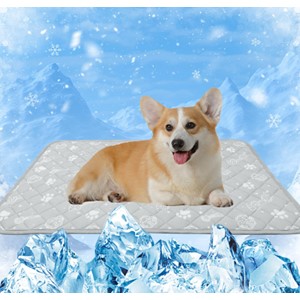
MH MYLUNE HOME Self Cooling Mat
Price At Time of Publish $40.00
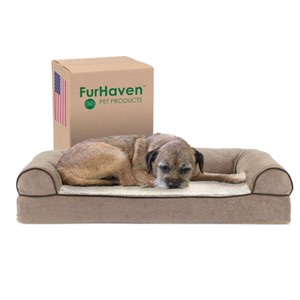
Furhaven Pet Products Cooling Gel Bolsters Small Bed
Price At Time of Publish $45.00
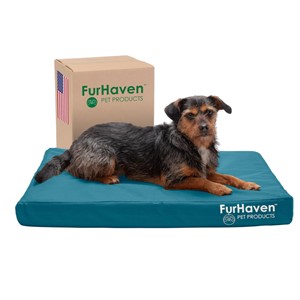
Furhaven Cooling Gel Medium Bed
Price At Time of Publish $42.00

ARF Pets Cooling Gel Pad
Price At Time of Publish $35.00
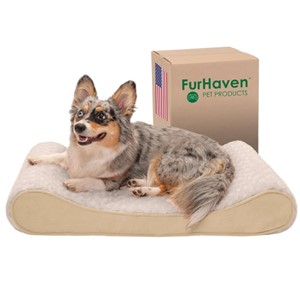
Furhaven Cooling Gel Small Bed
Price At Time of Publish $50.00
Price At Time of Publish $50.00
Orthopedic Dog Beds
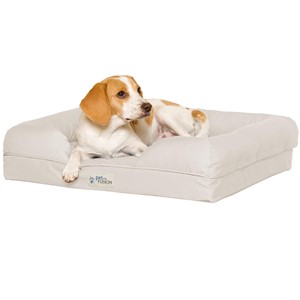
PetFusion Orthopedic Dod Bed
Price At Time of Publish $80.00
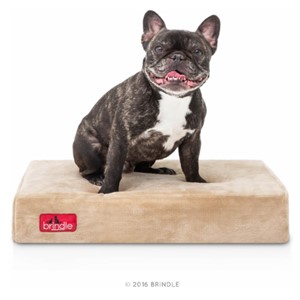
Brindle Orthopedic Bed Khaki
Price At Time of Publish $30.00
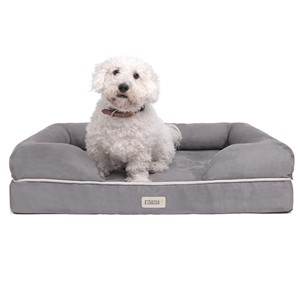
Friends Forever Orthopedic Bolster Bed
Price At Time of Publish $53.00
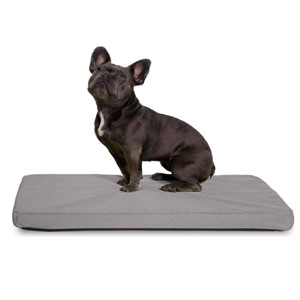
K9 Ballistics Tough Orthopedic Small Crate Bed
Price At Time of Publish $89.00

MidWest Homes Small Bolster Dog Bed
Price At Time of Publish $10.00

JOYELF Orthopedic Small Sofa Bed
Price At Time of Publish $40.00
Bolster Dog Beds
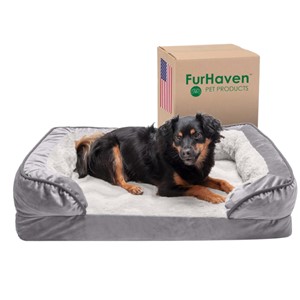
Furhaven Small-Medium Bolster Dog Bed
Price At Time of Publish $57.00
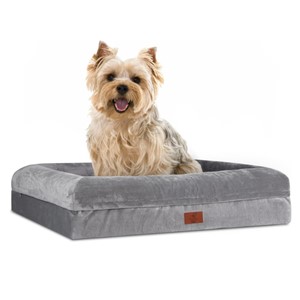
Yiruka Small Bolster Sofa Dog Bed
Price At Time of Publish $40.00
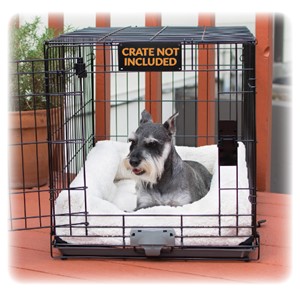
K&H Pet Products Bolster Crate Pad
Price At Time of Publish $22.00

Leasure Small Bolster Dog Bed
Price At Time of Publish $40.00
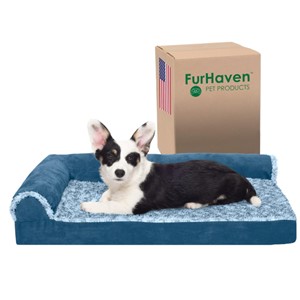
Furhaven Small-Medium L-Shaped Bed
Price At Time of Publish $39.00
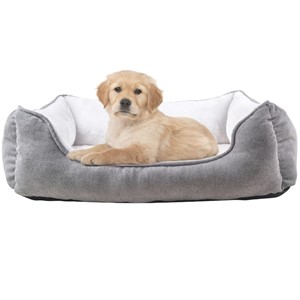
Long Rich Bolster Small Bed
Price At Time of Publish $27.00
Elevated Dog Beds
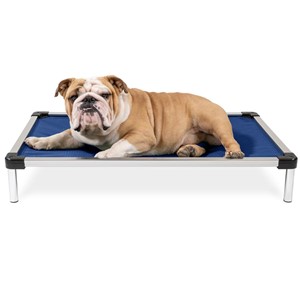
K9 Ballistics Chew Proof Elevated Small Bed
Price At Time of Publish $129.00
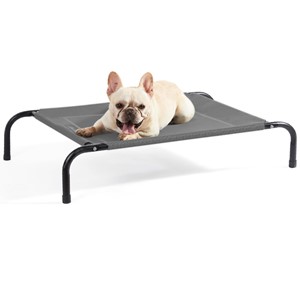
Bedsure Medium Elevated Dog Bed
Price At Time of Publish $33.00
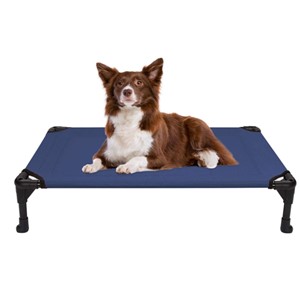
Veehoo Medium Elevated Dog Bed
Price At Time of Publish $45.00
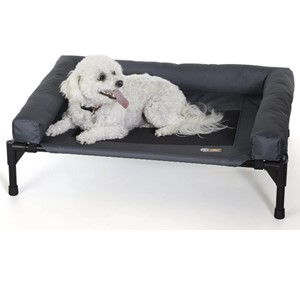
K&H Pet Products Elevated Bolster Dog Bed
Price At Time of Publish $57.00
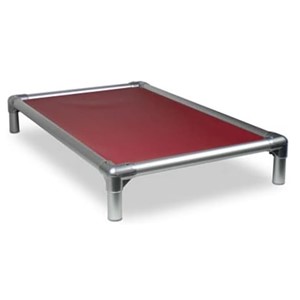
Kuranda Elevated Chew Proof Small Dog Bed
Price At Time of Publish $134.00

Coolaroo Small Elevated Dog Bed
Price At Time of Publish $21.00
Shop Cave/Donut Dog Beds
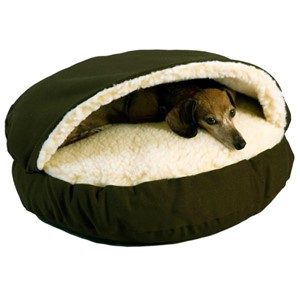
Snoozer Cozy Cave Bed
Price At Time of Publish $87.00
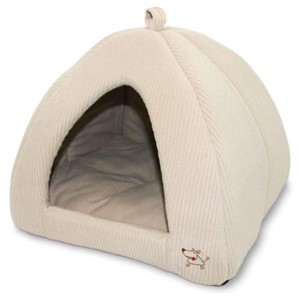
Best Pet Supplies Tent Bed
Price At Time of Publish $23.00
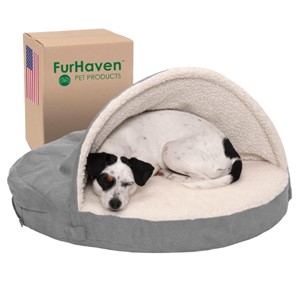
Furhaven Round Orthopedic Cave Bed
Price At Time of Publish $30.00
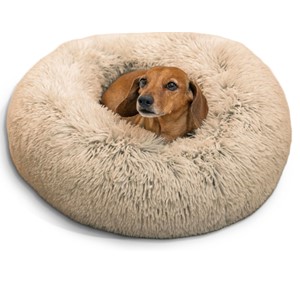
Best Friends by Sheri Original Calming Donut Bed
Price At Time of Publish $25.00
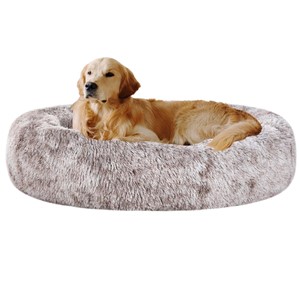
Coohom Oval Calming Donut Cuddler Bed
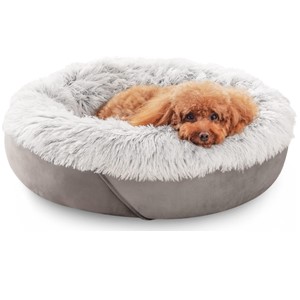
JOEJOY Calming Donut Small Dog Bed
Price At Time of Publish $33.00
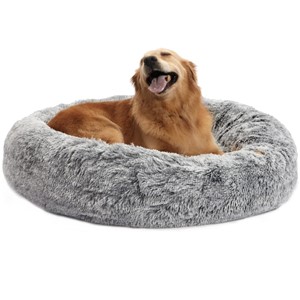
Bedfolks Calming Donut Dog Bed
Price At Time of Publish $66.00
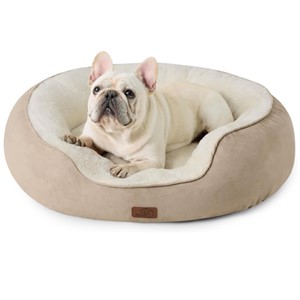
Bedsure Medium Donut Dog Bed
Price At Time of Publish $36.00

Bedsure Medium Donut Dog Bed
Price At Time of Publish $40.00
Related Articles
Below are some other articles you may be interested in reading. Just select on the topic of interest to learn more about it.
- Best Healthy Dog Food Brands
- Christmas Presents for My Dog
- Crates for Dogs
- Critical Signs Your Dog Needs Help
- Dog Training Techniques
- How To Train a Puppy
- Positive Reinforcement for Dog Training
- Puppy Proofing Your House
- Training Dog with Treats
- Using Alexa for Dog Behaviors
Go back to the Dog Luxury Beds home page.

